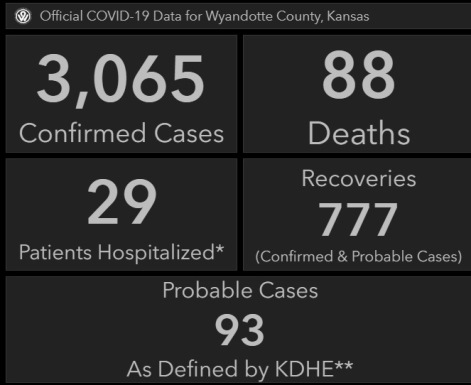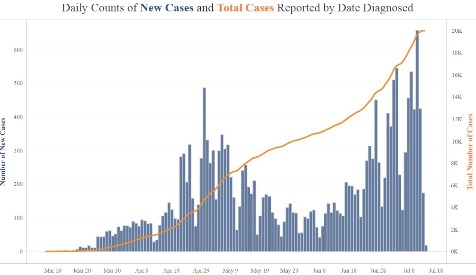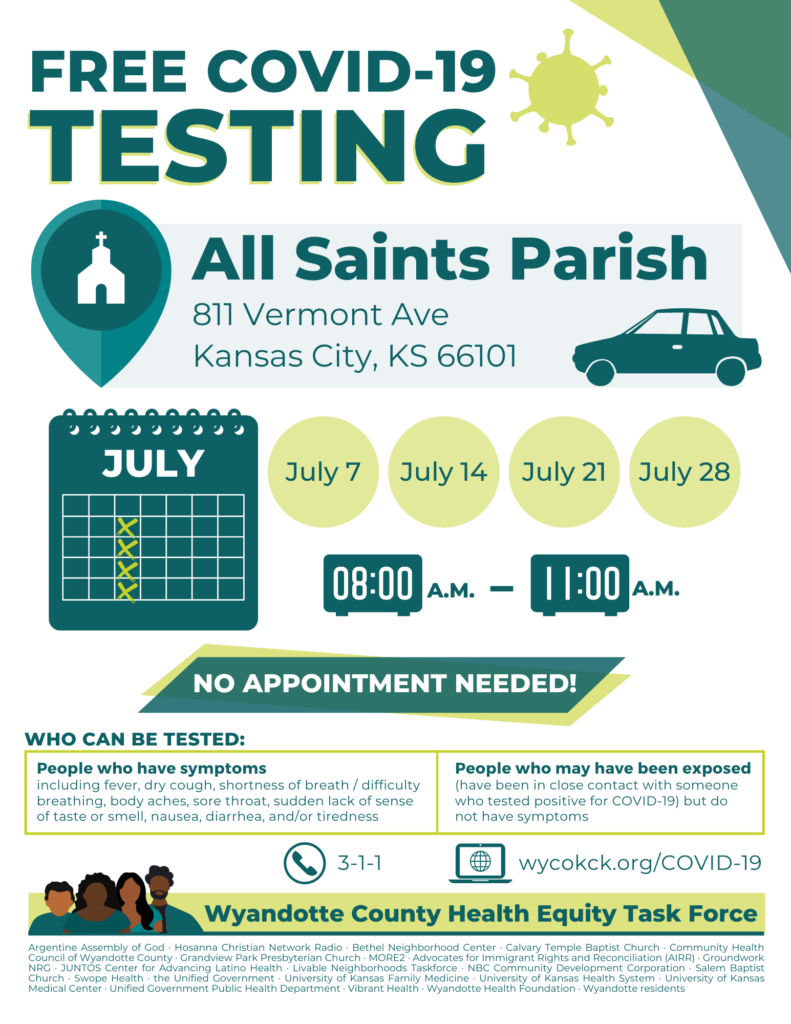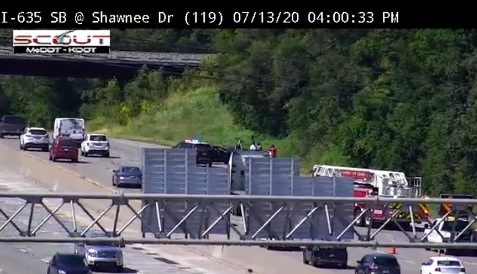

Kansas recorded 1,447 new COVID-19 cases from Friday morning to Monday morning, according to figures from the Kansas Department of Health and Environment.
The numbers rose to 20,058 on Monday morning, KDHE reported on its website.
There were four more deaths statewide, according to the KDHE.
According to KDHE figures, Wyandotte County had a 239 case increase from Friday morning to Monday morning.
On the Wyandotte County UG COVID-19 website, Wyandotte County had 3,065 cases at 1 p.m. Monday, an increase of 15 cases from 1 p.m. Sunday. The number of deaths was the same as Sunday, at 88 cumulative total.
Other counties on the KDHE website included these total cumulative cases:
Johnson, 3,160
Leavenworth, 1,248
Sedgwick (Wichita area), 2,422
Shawnee County (Topeka area), 1,048
Douglas, 456
Riley, 331
Dr. Rachel Liesman, director of microbiology in pathology and laboratory medicine at the KU Health System, said the health system would perform its 40,000th test on Monday. Currently, the health system is doing 800 to 900 tests a day, she said. They have limited supplies and cannot do more tests, she added. Everyone continues to have concerns about the supply chain, she said.
She said saliva testing for COVID-19 is pretty good, but the nasal swab test is still the most accurate test. She added studies are being done to gauge the results of the accuracy of the tests. The saliva test is gaining in popularity because of the shortage of supplies needed for the nasal swab test.
Dr, Dana Hawkinson, medical director of infection prevention and control at the University of Kansas Health System, reported 24 patients with COVID-19 in the hospital on Monday morning, an increase of two from Friday. Ten patients were in the intensive care unit, up from seven on Friday. Three patients were on ventilators, the same number as Friday.
Dr. Hawkinson said the slightly increased numbers are a trend around the Kansas City metropolitan area.
During the video news conference, Dr. Hawkinson said when a vaccine becomes available, perhaps in six to nine months, that will contribute to herd immunity.
Currently, only 10 to 12 percent of the population is estimated to have been infected with COVID-19, and herd immunity usually requires 80 to 90 percent, he said. Even if 60 to 70 percent of the people got vaccines or had previously been infected, that would still leave 30 to 40 percent that were susceptible to the virus.
Vaccines are the safer way, according to doctors. Doctors don’t support people trying to get to herd immunity through “COVID parties,” or through exposing more people to the virus.
“The problem is it overwhelms health systems and a lot of people die,” Dr. Steve Stites, chief medical officer at KU Health System, said. They also don’t want to shut down the economy, he added.
Dr. Stites advised people to follow social distancing guidelines, don’t go into crowded places, wear a mask and wash hands. Be responsible and don’t think that it doesn’t matter, he added.
To view the KU doctors’ news conference, visit https://www.facebook.com/kuhospital/videos/312310916622001
The governor’s executive order on masks is at https://governor.kansas.gov/wp-content/uploads/2020/07/20200702093130003.pdf.
The governor’s news release on the mask order is at https://governor.kansas.gov/governor-laura-kelly-signs-executive-order-mandating-masks-in-public-spaces/.
The Wyandotte County mask order is at https://www.wycokck.org/WycoKCK/media/Health-Department/Documents/Communicable%20Disease/COVID19/06272020LocalHealthOfficerOrderRegardingMasks.pdf
A news release on the Wyandotte County mask order is at https://www.wycokck.org/WycoKCK/media/Health-Department/Documents/Communicable%20Disease/COVID19/06272020PressReleaseLHORequiresPublicToWearMasks.pdf.
Wyandotte County now has posted an application for nonprofits, government agencies, school districts and businesses in Wyandotte County that want to apply for CARES Act funding. The web address is https://us.openforms.com/Form/6273fe80-8bba-4c18-b4e7-e551096d8a83.
For information on how to make an easy no-sew mask, visit https://wyandotteonline.com/how-to-make-a-no-sew-cloth-mask/.
For more information about COVID-19 testing, including other sites, visit https://wyandotte-county-covid-19-hub-unifiedgov.hub.arcgis.com/pages/what-to-do-if-you-think-you-have-covid-19. Residents also may call 3-1-1 for more information about testing.
The state’s COVID-19 test page is at https://www.coronavirus.kdheks.gov/280/COVID-19-Testing.
Residents may visit the UG COVID-19 website at https://alpha.wycokck.org/Coronavirus-COVID-19-Information or call 311 for more information.
Wyandotte County is currently under Phase 3. See covid.ks.gov.
The state plan’s frequently asked questions page is at https://covid.ks.gov/wp-content/uploads/2020/05/Reopening-FAQ_5.19.2020_Final.pdf.
The CDC’s COVID-19 web page is at https://www.cdc.gov/coronavirus/2019-nCoV/index.html.


